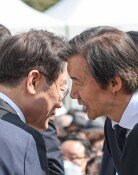Random deadline for supplementary budget should be revised
Random deadline for supplementary budget should be revised
Posted July. 02, 2020 07:37,
Updated July. 02, 2020 07:37
Concerns are growing as the Democratic Party of Korea is rushing through the third supplementary budget bill worth 35 trillion won. Budget bills are required to be reviewed and approved by standing committees before they are presented to the Budget Settlement Committee. However, standing committees are signing off the supplementary budget bill without an adequate review. For instance, the committee under the floor leader of the ruling party took only 50 minutes to finish the review. At this point, it seems as if it is their mission to get everything done within four days after the chairmanship of all standing committees was taken by ruling party members.
The Democratic Party of Korea set the deadline for the supplementary budget as the closing date of the provisional session of the National Assembly, which should be adjusted for national interest. The ruling party should stop carrying out arbitrary reviews and let opposition party members participate in the review by postponing the deadline to July 11 as requested by the opposition party.
For its part, the main opposition United Future Party should try to find a way of being involved in the review as it has committed itself to resolve issues within the National Assembly as opposed to outside it. Instead of demanding that the National Assembly Speaker cancel his appointments, they should submit a list of standing committee members of the party so that the structure of standing committees can be modified. Once the reorganization is done, they should raise issues with the supplementary budget and propose solutions.
The Democratic Party of Korea said the provisional session of the National Assembly for July would start as soon as the one for June closes. It is to push through laws required to launch the corruption investigation office for high-ranking officials and its implications. However, rushing them through the National Assembly just to meet the deadline will be met with a backlash. Currently, two of the seven representatives who can refer candidates for the head of the office are opposition party members, and the ruling party is threatening to reduce the number even further, which will undermine the political neutrality of the office. The opposition party should prepare to refer candidates. Neither the supplementary budget nor the corruption investigation office should be swayed by political considerations.







